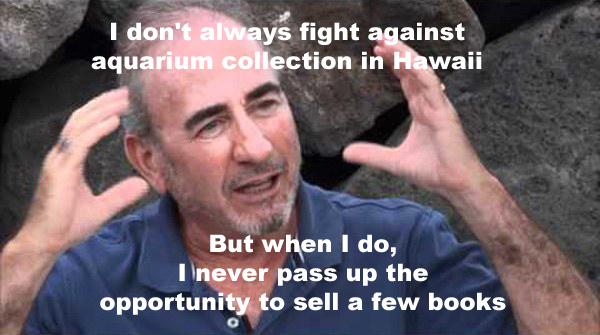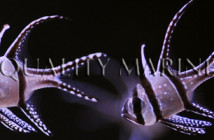Here’s a real shocker (rolls eyes), Sea Shepherd has launched a new campaign that shifts some of its focus from Japanese whalers onto aquarium collectors. Operation Reef Defense is a global campaign aimed at ending the destruction of coral reefs and neutralizing any threats they may face. While this effort claims to be global in its scope, we all know what the intent really is. With Robert “Snorkel Bob” Wintner serving as vice prez to Sea Shepherd, we are confident that the aquarium trade will be the “threat” that receives the most attention, and Hawaii will be the hotspot.
The announcement from Sea Shepherd starts out with that global undertone that the conservation effort says that it is aimed at. In fact, the aquarium trade is only barely mentioned in the first paragraph, and Sea Shepherd uses a somewhat vauge term, reef wildlife trafficking, to sneak it in there. Instead of focusing squarely on the aquarium trade, the campaign claims it will tackle global issues such as pollution, overfishing, coastal development, and global warming. Interestingly, tourism isn’t on that list, but more on that later.
The third paragraph in, and after a bunch of words describing the organizations lofty goals, we start to get a better feel for how the aquarium trade in Hawaii will be affected. According to the announcement, Sea Shepherd has already begun to collaborate wth dive shops and the surfing community in Hawaii to “bring light to the destruction happening beneath the waves”. The following paragraph, and the ones immediately after it, get more in depth with the Hawaiian sourced aquarium trade, shunning the other global efforts in the process. The announcement talks about Wintner’s experience with our industry, tossing out a few uncited numbers in the process, which is typical of Snorkel Bob and the anti-aquarium movement.
As with all of the discussion being led by the anti-aquarist movement, the tourism industry is left unscathed. We all know why, as Wintner has made his living off of tourist dollars with his Snorkel Bob dive shops. Still, his personal vendetta even pushes the perceived impact of the aquarium trade to be greater than all of the other threats mentioned.
Here’s the announcement from Sea Shepherd
Sea Shepherd Conservation Society is proud to announce the launch of Operation Reef Defense, a global campaign to end the destruction of coral reefs and the many threats they face worldwide. Coral reefs represent some of the planet’s most biologically diverse ecosystems providing critical habitat to approximately 25 percent of all marine species, but they are disappearing at an alarming rate due to human-induced activities such as pollution, overfishing, reef wildlife trafficking, coastal development and global warming. Thirty percent of the world’s coral reefs have died in the last 50 years, and another 30 percent have suffered severe damage. Of the reefs remaining, it is estimated that 60 percent could face extinction in less than 25 years.
According to Sea Shepherd Hawaii Director & Reef Defense Campaign Leader, Deborah Bassett, “With the oceans of the world under attack from commercial extraction and pollution, our mission remains steadfast to defend marine habitat and wildlife to the fullest extent — from the smallest of reef species to the largest marine mammals and apex predators. Time is running out for these great rain forests under the sea, so we must act now.”
Although Sea Shepherd is best known for its direct action efforts on the high seas, Sea Shepherd remains committed to protecting marine wildlife in all habitats, including the coastal awareness campaign orchestrated for Operation Reef Defense. Sea Shepherd plans to collaborate with Hawaiian dive shops and the surfing community to bring light to the destruction happening beneath the waves. With the campaign currently underway in Hawaii, Sea Shepherd’s global chapters will soon mirror similar programs in their local waters.
Reef degradation is a global crisis. Of the 100 countries with coral reefs, reef degradation is highest in Southeast Asia where nearly 95 percent of the region’s reefs are threatened, mainly due to overfishing and destructive fishing practices. The loss of underwater life and habitat is also ever-present in our own backyard of Hawaii, where the top ten sought-after species of fish for aquariums have decreased by 59 percent over the last 20 years, while the most popular aquarium fish has declined in abundance from 38 to 57 percent. In Jamaica, it is estimated that almost all of the reefs are dead or severely degraded from overfishing and coastal pollution.
Sea Shepherd’s Vice President Robert Wintner, a veteran campaigner against the aquarium trade and its devastating impact to Hawaiian reefs stated, “Sea Shepherd will champion marine habitat and wildlife from the ravages of urban and corporate effluent and the destruction caused by the aquarium trade. Massive reef wildlife dies every year as disposable ornamentation in the vicious cycle of wildlife trafficking for the pet trade. Death generates continuing demand, driving the aquarium trade to strip reefs bare. Over 25 million sea creatures are in the commercial aquarium pipeline at any given moment – and nearly all will die within a year from the point of capture.”
“Sea Shepherd is very much concerned for this wildlife and needs public support to translate these concerns into action. We may lose support from people who keep captive marine wildlife for a hobby, but as Captain Paul Watson has stated — our clients are the creatures of the sea. We hope that all people who are concerned for the oceans will recognize the importance of protecting reef eco-systems worldwide, and that if any of our supporters do keep marine wildlife in an aquarium, they will care for the wildlife they have and refrain from purchasing any more,” Wintner added.
Coral reefs simply cannot support continued unlimited resource usage or unmanaged global trade. Such drastic ongoing decline of healthy reefs will pose serious consequences for animals both on land and in the water and people worldwide.






